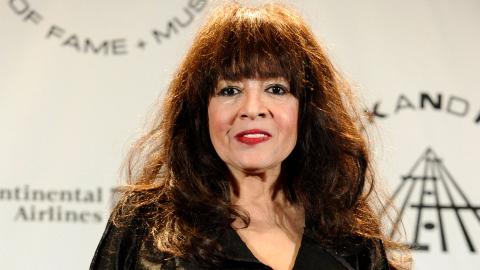
Ronnie Spector, Leader of '60s Girl Group 'The Ronettes' Dies
Ronnie Spector, the bee-hived pop icon who soared to stardom in the 1960s as the leader of the girl group The Ronettes, has died. She was 78.
Spector died Wednesday after a brief battle with cancer, her family said.
“Ronnie lived her life with a twinkle in her eye, a spunky attitude, a wicked sense of humor, and a smile on her face. She was filled with love and gratitude,” a statement said.
Alongside her sister Estelle Bennett and cousin Nedra Talley, Ronnie Spector and the Ronettes scored major hits with pop masterpieces like "Chapel of Love," "Baby, I Love You," "Walking in the Rain," "I Can Hear Music" and "Be My Baby."
On Thursday, tributes flooded social media, from Stevie Van Zandt saying it was an honor to produce her, to Brian Wilson, who wrote on Twitter, “I loved her voice so much and she was a very special person and a dear friend.” Diane Warren called her “The voice of a million teenage dreams including mine.”
Her cousin and former band-mate Nedra Talley-Ross told CBN News, "Ronnie and I were so close growing up that I called her 'my breath'. This morning I woke up fighting for that breath knowing that she is no longer on this earth."
Talley-Ross, who is part of the CBN family with her husband CBN Producer Scott Ross, is the last surviving member of The Ronettes. She said in a statement, "Beyond The Ronettes and music, we shared our whole lives. We were baptized together."
"To my kids, she is Aunt Ronnie," the statement continued. "Recently she said, 'Nedra, there's nobody left but the two of us.' We were together through the best and the most difficult of times and we made history. As the last remaining Ronette, I will continue to keep her memory and the music alive. Part of me is gone and can never be replaced. I love and miss her."
WATCH: CBN’s Scott Ross and Nedra Talley-Ross Tell Their Story to The 700 Club:
The Ronettes' youthful appeal and powerful voices, plus songwriting and producing help from music industry icon Phil Spector, turned them into one of the premier acts of the girl-group era, touring England with The Rolling Stones and befriending the Beatles.
Ronnie Spector, born Veronica Bennett, and her multiracial bandmates grew up in the Washington Heights area of Manhattan. They began singing and dancing in clubs as Ronnie and the Relatives, becoming noteworthy for their liberal use of eyeliner and mascara.
“The louder they applauded, the more mascara we put on the next time,” she wrote in her memoir. “We didn’t have a hit record to grab their attention, so we had to make an impression with our style. None of it was planned out; we just took the look we were born with and extended it.”
In March 1963, Estelle Bennett managed to arrange an audition in front of Phil Spector, known for his big, brass-and-drum style dubbed the “wall of sound.” They were signed to Philles Records in 1963. After being signed, they sang backup for other acts until Spector had the group record “Be My Baby” and “Baby I Love You.”
The group’s debut album, “Presenting the Fabulous Ronettes Featuring Veronica,” was released in 1964. Five of its 12 tracks had made it to the U.S. Billboard charts.
After touring Germany in 1967, the Ronettes broke up. Spector married Ronnie in 1968, then she said he kept her locked in their Beverly Hills mansion. Her 1990 autobiography “Be My Baby: How I Survived Mascara, Miniskirts And Madness” tells an unhappy story of abuse. The couple divorced in 1974. Phil Spector was later sent to prison in 2009 for the murder of actress Lana Clarkson and died in 2021.
When the Ronettes were inducted in the Rock and Roll Hall of Fame in 2007, Keith Richards of The Rolling Stones remembered opening for the trio in England in the mid-1960s.
“They could sing all their way right through a wall of sound,” Richards said. “They didn’t need anything. They touched my heart right there and then and they touch it still.”
Even after the Ronettes broke up, Ronnie Spector continued to tour and make music, including “Take Me Home Tonight” with Eddie Money, recording on Billy Joel’s “Say Goodbye to Hollywood” and with Bruce Springsteen’s E Street Band. She also recorded the 1999 EP “She Talks to Rainbows,” which included her first-ever recording of “Don’t Worry Baby,” written for her by Brian Wilson.
She is survived by her husband, Jonathan Greenfield, and two sons, Jason and Austin.
***Please sign up for CBN Newsletters and download the CBN News app to ensure you keep receiving the latest news from a distinctly Christian perspective.***




